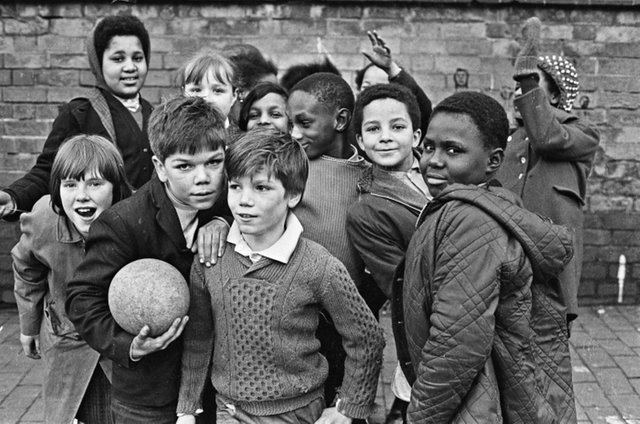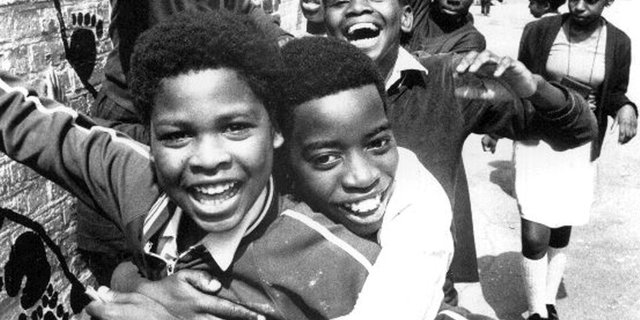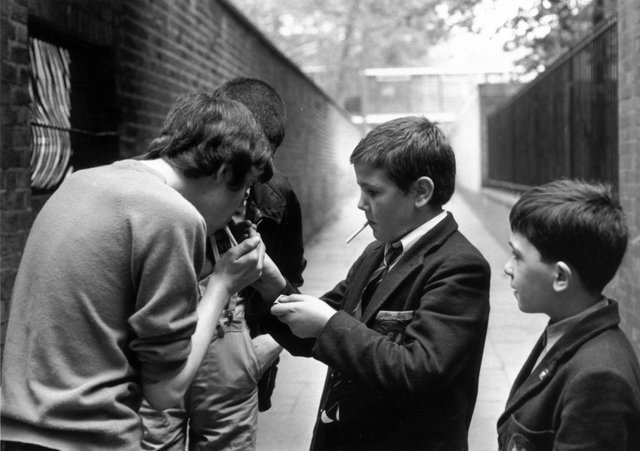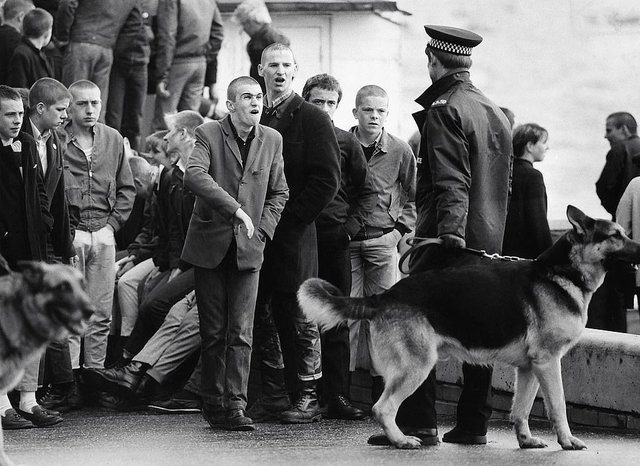Black British School Daze
 School Life in the second largest city in Britain--Birmingham.
School Life in the second largest city in Britain--Birmingham.Image source
The National Society for the Prevention of Cruelty to Children (NSPCC) recently reported that kids as young as ten in England have taken to whitening their faces in an attempt to fit in after repeatedly being the target of hate crimes and being told to "go back to your own country" in Brexit Britain. It seems the more things change is the more they stay the same.
At twelve, my best friend was a white boy named David, who lived across the road from us. He and I walked to school together, went berry picking with his dad in summer, slept in each other's house or pitched a tent in the back yard just for fun in stormy weather.
One day he became ‘an accidental Skinhead’ when the barber gave him a lopsided haircut. I didn't laugh when his white mate, Steve, said he looked just like a plucked chicken. David went back the next day and had his head shaved. He never spoke to me again after Steve had his hair chopped off too, although I lived on the same road in the same house and went to the same school for four more years. He developed Skinhead associations in steel-toed boots and drainpipe denim.
 Schoolyard friendships, 1970s, London.
Schoolyard friendships, 1970s, London.This instant separation was the ‘normal’ pattern of racial division in South London, as we moved from the primary school innocence of multi-racial friendships, into a comprehensive education system reflecting the myriad concerns of a racist adult world. Consequently, the black boys tended to band together, as did the white boys, and the few Asians. There was safety in numbers we felt.
Our particular group of boys liked the same music. We shared our teachers' over-enthusiastic push for us to take up sports. We suffered their ‘limited expectations' of our potential educational and vocational achievements. A point underlined by the over-representation of black students in the low ability ‘C’ and ‘D’ band classes. Of the approximately 160 black youngsters in the first year (40%), there were only three in ‘A’ band classes (3,3 %). At the start of term, there had been just two.
My Primary School teacher had developed a notion that I was ‘educationally subnormal’ (ESN) and in need of remedial classes (Special Ed.) The term ‘ESN’ was then a popular label given to black children, particularly those who were new to British schools. As low expectations lead to low achievements, this 'self-fulfilling prophecy' may well have become fact had it not been for my mother's tenacity, regular elocution lessons, and private one-to-one tuition from a band of strict Catholic nuns. Three weeks into school, and I am moved from the ‘C’ to the ‘B’ to the ‘A’ band. One year later and a black girl also joins our ranks. We are now four black pupils out of 90 ‘A’ band students.
 Holland Park Schoolboys lighting up illicit cigarettes, 1970, Evening Standard/Getty Images).
Holland Park Schoolboys lighting up illicit cigarettes, 1970, Evening Standard/Getty Images).Image source
We saw Hyacinth in classes only, but Marsid, Steven, and I hung out both during and after school. Since Steven's mum would not let him roam too far from “Snobs Ville” where they lived, more often than not, we traded him for Andrew – the school's champion sportsman and a ‘B’ band student. Times had changed. It was 1979, Margaret Thatcher had just become Britain's first woman prime minister. We were now turning sixteen, gaining in confidence, and approaching manhood. Like the new prime minister, we too wanted to explore new territory, to experience things our parents had never dared consider. We were black, but we were born here. There was nothing we felt we could not do in our own country. Then as the pulse of black ‘disco’ and ‘dance’ music began to permeate the club scene of Britain's major cities, we found in its rhythm our raison d’être.
Zoom-Zooms nightclub was nowhere near where we lived. We had each travelled our, miles to get there, but since they played the best Jazz-Funk in a ten-mile radius of Lewisham Town Centre on a Monday night, all the ‘dance freaks’ came out this way to party. We three knew that if we were lucky, we would get the last night-bus outside the club and straight to the safety of multi-racial Lewisham where we could bus, taxi or walk it home. We kissed our, goodnight, but Lady-luck was not on our side. We had to wait for a bus on a dark street in Eltham.
If you were black, sixteen, and travelling across London in 1979, you quickly learnt to sense where your face was not wanted. Eltham was such a place. It was until recently one of the few parts of South London where the traditional “British Bulldog Spirit” could still be seen in all its ferocity. Most black South Londoners ‘won't set foot there’, but we did not know that then. So, when the skinhead tapped me on the shoulder from behind, I turned to face him, and he broke my nose. His five friends charged, howling, ‘Niggers!'
 Working-class skinheads taunting police in Southend in 1981.
Working-class skinheads taunting police in Southend in 1981.Image source
We ran! We were in danger, outnumbered, they were swinging metal chains, and we ran. Even when we flagged a police car, and thought it would stop to protect us, we kept on running. Then while the officers inside gave us the finger sign for “Up-Yours!” we turned a corner and banged on a door.
A frail, frightened, woman cracked a peek from behind curtains and glass. Her fear was no match for our insistence. She grudgingly allowed us to call the police. She then made us wait outside, so as not to have my blood soak the red of her blood-red carpet. The police came late if they came at all. That winter's night changed our lives. We never went back to Zoom-Zooms. I was never again in Eltham.
If
from the chains
of our broken dreams
we fled
across opal seas
Then why to this country?
If riding through the snow-white cities
we had seen dead men
their lives lost on strange excitements
Would we have stayed?
But we did not see the daggers in their smiles
as we moved into their indirect streets
Or sense the fear cloud their animal eyes
like once when under intense light
a dead boy struck me
I feel
I fell
I suffer still
And Time
as under a rock
Trapped me there.
Damn!
Shout out to Chapman.
Well I'm glad I was a couple of decades late for this.
But now in 2019, we've got black kids in schools whitening their skin in order to fit in. We would never have done that back in the day.
Good post friends.me like it artikel
Cheers!
What a great piece of writing again mate.
When you make the reader feel they have become the protagonist in the story then that's a proper talent.
Best wishes and thanks for sharing a personal story, these are the stories and posts I joined Steem to read.
Your beer quota in Bangkok has been increased to 2!
Posted using Partiko Android
Thank you again!! I'm gonna hold you to those beers.
Congratulations! Your post has been selected as a daily Steemit truffle! It is listed on rank 21 of all contributions awarded today. You can find the TOP DAILY TRUFFLE PICKS HERE.
I upvoted your contribution because to my mind your post is at least 2 SBD worth and should receive 104 votes. It's now up to the lovely Steemit community to make this come true.
I am
TrufflePig, an Artificial Intelligence Bot that helps minnows and content curators using Machine Learning. If you are curious how I select content, you can find an explanation here!Have a nice day and sincerely yours,

TrufflePigI'm mightily flattered, @TrufflePig. Nice one!